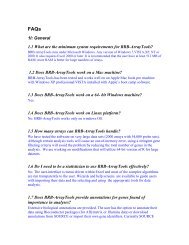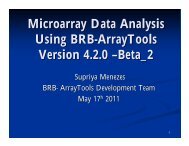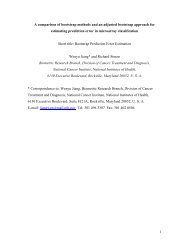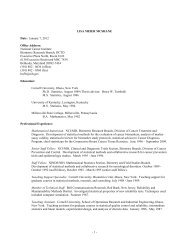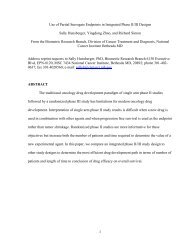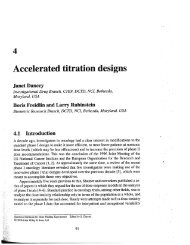Identification of Pharmacogenomic Biomarker Classifiers in Cancer ...
Identification of Pharmacogenomic Biomarker Classifiers in Cancer ...
Identification of Pharmacogenomic Biomarker Classifiers in Cancer ...
Create successful ePaper yourself
Turn your PDF publications into a flip-book with our unique Google optimized e-Paper software.
the studies should be kept separate. Developmental studies are exploratory, though they<br />
should result <strong>in</strong> completely specified b<strong>in</strong>ary classifiers. Studies on which claims <strong>of</strong> drug<br />
benefit are based should be non-exploratory, but should <strong>in</strong>stead test prospectively def<strong>in</strong>ed<br />
hypotheses about treatment effect <strong>in</strong> a pre-def<strong>in</strong>ed patient population.<br />
6. Estimates <strong>of</strong> Predictive Accuracy <strong>in</strong> Developmental Studies<br />
Developmental studies are analogous to phase 2 cl<strong>in</strong>ical trials. They should <strong>in</strong>clude an<br />
<strong>in</strong>dication <strong>of</strong> whether the pharmacogenomic classifier is promis<strong>in</strong>g and worthy <strong>of</strong> phase 3<br />
evaluation. There are special problems <strong>in</strong> evaluat<strong>in</strong>g whether classifiers based on high<br />
dimensional genomic or proteomic assays are promis<strong>in</strong>g however. The difficulty derives<br />
from the fact that the number <strong>of</strong> candidate features available for use <strong>in</strong> the classifier is<br />
much larger than the number <strong>of</strong> cases available for analysis. In such situations, it is<br />
always possible to f<strong>in</strong>d classifiers that accurately classify the data on which they were<br />
developed even if there is no relationship between expression <strong>of</strong> any <strong>of</strong> the genes and<br />
outcome {Radmacher, 2002 #15}. Consequently, even <strong>in</strong> developmental studies, some<br />
k<strong>in</strong>d <strong>of</strong> validation on data not used for develop<strong>in</strong>g the model is necessary. This “<strong>in</strong>ternal<br />
validation” is usually accomplished either by splitt<strong>in</strong>g the data <strong>in</strong>to two portions, one<br />
used for tra<strong>in</strong><strong>in</strong>g the model and the other for test<strong>in</strong>g the model, or some form <strong>of</strong> crossvalidation<br />
based on repeated model development and test<strong>in</strong>g on random data partitions.<br />
This <strong>in</strong>ternal validation should not, however, be confused with external truly <strong>in</strong>dependent<br />
validation <strong>of</strong> the classifier.<br />
12



